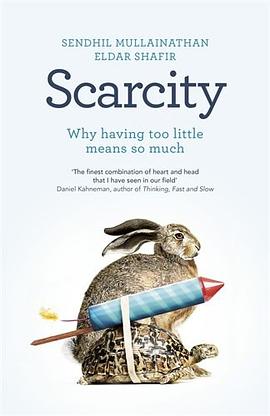

具体描述
A surprising and intriguing examination of how scarcity—and our flawed responses to it—shapes our lives, our society, and our culture
Why do successful people get things done at the last minute? Why does poverty persist? Why do organizations get stuck firefighting? Why do the lonely find it hard to make friends? These questions seem unconnected, yet Sendhil Mullainathan and Eldar Shafir show that they are all are examples of a mind-set produced by scarcity.
Drawing on cutting-edge research from behavioral science and economics, Mullainathan and Shafir show that scarcity creates a similar psychology for everyone struggling to manage with less than they need. Busy people fail to manage their time efficiently for the same reasons the poor and those maxed out on credit cards fail to manage their money. The dynamics of scarcity reveal why dieters find it hard to resist temptation, why students and busy executives mismanage their time, and why sugarcane farmers are smarter after harvest than before. Once we start thinking in terms of scarcity and the strategies it imposes, the problems of modern life come into sharper focus.
Mullainathan and Shafir discuss how scarcity affects our daily lives, recounting anecdotes of their own foibles and making surprising connections that bring this research alive. Their book provides a new way of understanding why the poor stay poor and the busy stay busy, and it reveals not only how scarcity leads us astray but also how individuals and organizations can better manage scarcity for greater satisfaction and success.
作者简介
Sendhil Mullainathan is Professor of Economics at Harvard University. His real passion is behavioral economics, understanding what makes people tick - whether a senior executive in New York or a farmer in rural Tamil Nadu.
He enjoys having written but is of a mixed mind about writing.
He also occasionally enjoys doing: he helped co-found a non-profit to apply behavioral science (ideas42); and has worked in government.
Much to the surprise of who know him well, he is a recipient of the MacArthur "genius" award.
His hobbies include basketball, googling and fixing-up classic espresso machines. He also enjoys speaking about himself in the third person, which works well for bios but less well in daily life.
Eldar Shafir is an American psychologist, and the author of Scarcity: Why Having Too Little Means So Much[1] (with Sendhil Mullainathan). He is the William Stewart Tod Professor of Psychology and Public Affairs at Princeton University Department of Psychology and the Woodrow Wilson School of Public and International Affairs. He is a Faculty Associate at the Institute for Quantitative Social Science at Harvard University. He is co-founder and Scientific Director at ideas42, a social-science R&D lab. His area of study is behavioral economics, that is, how the decisions people make affect their financial outcomes. His research has led him to the general conclusion that people often make inadvisable decisions on financial matters when they think they are being rational.
目录信息
Chap. 1 - The good: scarcity can cause focus. The bad: focus can mean inattention to other things.
Chap. 2 - Scarcity causes an internal disruption that makes it harder to make good decisions.
Chap. 3 - Slack (the opposite of scarcity) allows better choices and reduces the bad consequences of failiure.
Chap. 4 - Poor people are sometimes more realistic about estimating costs, because they have to be.
Chap. 5 - Borrowing when you're short of cash leads to a descending spiral of debt.
Chap. 6 & 7 - Poverty is a vicious circle of scarcity leading to bad decisions leading to scarcity...
Chap. 8 - Poverty can be alleviated by creating slack, such as extra cash or day care to create more time.
Chap. 9 - Efficient use of resources and division of labor helps organizations become more efficient.
Chap. 10 - Efficient use of self-control helps with life issues.
· · · · · · (收起)
读后感
我最近在看决策相关的书籍,其中《稀缺:我们是如何陷入贫穷与忙碌的》最为吸引我,因为我经常像作者所说的那样,陷入忙乱而无法自拔的境地。而我更想知道的是:穷人到底是怎样进入这种越忙越穷、越努力越悲惨的恶性循环的?阅罢此书,我终于从作者塞德希尔·穆来纳森(哈佛大...
评分《稀缺》我们是如何陷入贫穷与忙碌的。关于稀缺的定义是拥有少于需要的感觉。现象:钱的问题会永远纠缠着穷人,时间问题只会永远烦扰着忙碌之人。你是否遇到这样的事情: 1.要做的事情太多,而用来要做事情的时间又太少,许多事情早就过了原定的截止日期一直在延期越来越让人担...
评分通常的解释是,因为蠢,所以赚钱能力差;因为懒,所以不能吃苦耐劳。两者相加导致穷,副产品是胖,因为意志力薄弱放纵食欲。 任何问题都不会只有一种正确的解释。《稀缺》提出了一个新观点:有没有可能是贫穷(稀缺)本身削弱了智力和意志力,进而加剧了贫穷(稀缺)?这有点...
评分还记得那个书店老板的故事,读书无数,头发快白了,博士毕业论文还是迟迟没有赶出来。很多时候,伟大的作品都在非常紧迫的时候完成。比如书中提到的那份美味佳肴。稀缺,会让我们变得专注。考试前的复习总是最有效的。但是,太专注了,我们的视野就小了,产生了管窥之见。比如...
评分千万不要以为这些人是一天到晚无所事事,其实很多人早就制定好了计划,目标也有了,动力也有了,但为什么就是无法有效的执行呢? 德鲁克在《卓有成效的管理者》中提到一个观点,有效率的管理者总是从如何规划自己的时间开始,因为时间这种资源如果浪费就无法挽回。 ...
用户评价
前期滥用资源→_→稀缺性→_→过于注意→_→带宽限制→_→进一步的循环
评分一句话来回说了一千遍:稀缺性占用你带宽,让你脑子想不清楚,也跳不出来因为稀缺性心态已经深植于潜意识,无论这稀缺是金钱、时间、社交还是卡路里额度。长袖才能善舞,从容(slack)才能不迫(妈的这还要你说
评分为什么感觉翻来覆去在说同一个事情?有些东西只是当常识在讲却没有研究数据支持,(例如wasp的巢穴比蜜蜂更不规整,因为前者是用土筑巢的后者用蜂蜡,作者认为是筑巢资源多寡导致行为不同,这万一和基因有关呢?)还有,作者选择性忽略富人possessive的一些行为,穷人也可能因为有spiritual experience变得从容,这就和外部资源无关,而是和内部认知评估有关了。这些都没涉及,说个卵。
评分关于行为心理学。我们的问题是由于bandwidth是limited的,所以通常 focus on urgent at the expense of important。很简单的道理,改正却不容易。
评分一本书只论证了一个问题:为什么越“穷”会越“穷”?穷,在一定程度上会引起专注。但另一方面,又大量占用了带宽(认知能力和执行能力)。在特定事件的专注(tunnelled),必然导致其他事情被遗忘或盲目。在一系列的救火过程中(firefighting)便不由自主的陷入恶性循环。进一步,富足(abundance)往往也孕育着稀缺的种子。“穷”往往是一系列行为和思维模式所导致。即便在富足时期,稀缺思维和行为也不能为未来带来冗余(slack)和容错(failure tolerance)。缺乏冗余和容错,任何系统都过于刚性,易碎易毁。所以,对个体而言,跳脱这种稀缺陷阱需要冗余和容错机制。对宏观政策,则需明晰个体的思考轨迹,辨别根本原委、建立制度和规则,以改变和完善社会。
相关图书
本站所有内容均为互联网搜索引擎提供的公开搜索信息,本站不存储任何数据与内容,任何内容与数据均与本站无关,如有需要请联系相关搜索引擎包括但不限于百度,google,bing,sogou 等
© 2025 book.quotespace.org All Rights Reserved. 小美书屋 版权所有




















